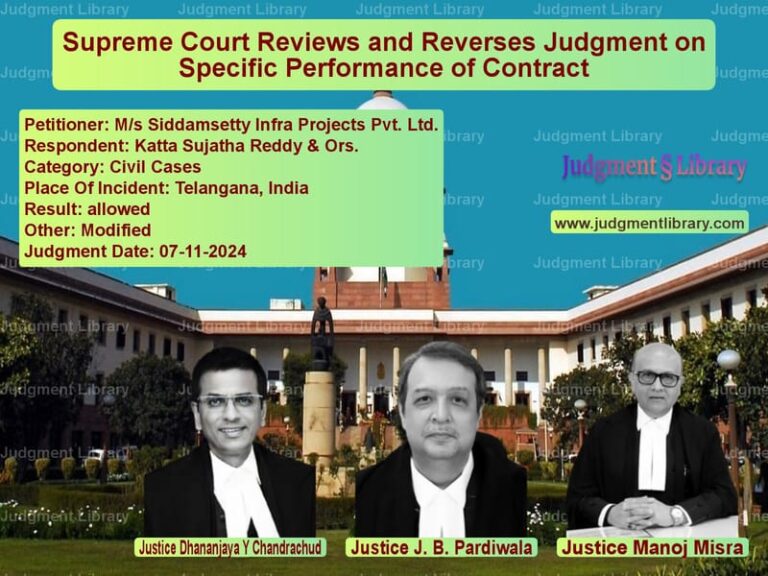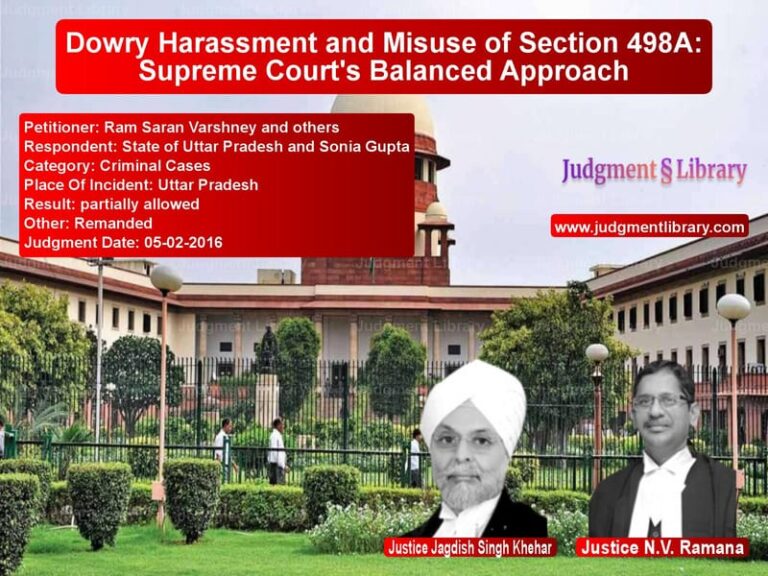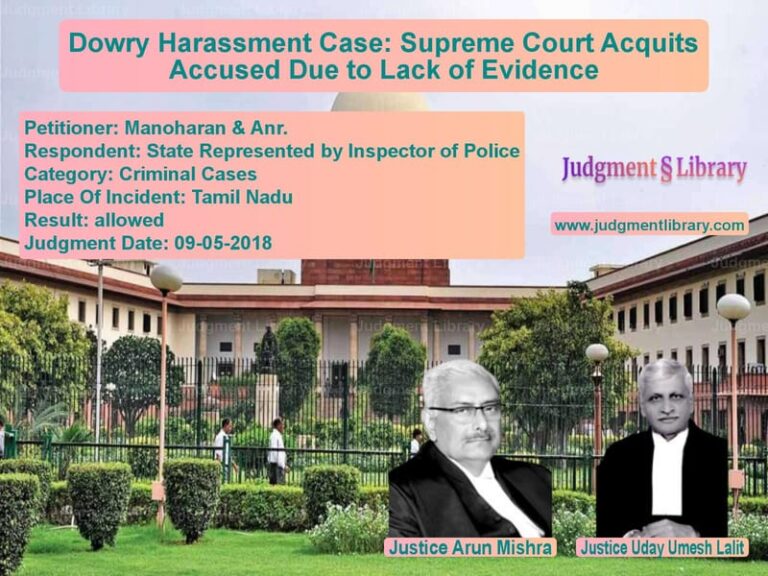Supreme Court Rules on Partnership Dispute: Decree Unenforceable After Partner’s Death
The case of S.P. Misra & Ors. v. Mohd. Laiquddin Khan & Anr. revolves around a dispute concerning a partnership agreement for real estate development. The Supreme Court upheld the decision of the Andhra Pradesh High Court, ruling that a decree obtained by one partner against another in a dissolved partnership is unenforceable against the legal heirs.
Background of the Case
The legal dispute originates from a partnership agreement between late Sri Jai Narayan Misra and late Smt. Hashmatunnisa Begum, entered into on April 14, 1982. The agreement pertained to the development of a land parcel in Paigah Compound, Hyderabad, measuring approximately 22,253 square meters. The land was owned by Hashmatunnisa Begum, and the partnership was formed to develop and sell the land.
During the course of the partnership, a dispute arose regarding a portion of 3,381 square meters of the property. Jai Narayan Misra, before his death, filed Original Suit No. 580 of 1988 before the City Civil Court, Hyderabad, seeking:
- A permanent injunction restraining the defendant (Hashmatunnisa Begum) from interfering in the development and sale of the land.
- A mandatory injunction directing the defendant to sign layout plans and other required documents for obtaining approval from the Cantonment Board, Secunderabad.
The trial court ruled in favor of Misra, granting the requested reliefs in its judgment on July 14, 1993. However, after the death of both partners, the legal heirs of Jai Narayan Misra sought to execute the decree against the legal heirs of Hashmatunnisa Begum.
The respondents (legal heirs of Hashmatunnisa Begum) contested the execution, arguing that the partnership had been dissolved upon the death of one of the partners, rendering the decree unenforceable. They filed an application under Section 47 of the Code of Civil Procedure (CPC), which was allowed by the City Civil Court, Hyderabad, and later upheld by the Andhra Pradesh High Court.
Legal Issues
- Whether a decree obtained against a deceased partner is enforceable against their legal heirs.
- Whether the terms of the partnership agreement override the statutory dissolution provisions under the Indian Partnership Act, 1932.
- Whether the legal heirs of a deceased partner automatically assume obligations under a partnership agreement.
Arguments by the Appellants (Legal Heirs of Jai Narayan Misra)
The appellants argued that:
- The partnership deed explicitly stated that in the event of a partner’s death, their legal heirs would automatically become partners and assume the same rights and responsibilities.
- The execution of the decree was necessary for the completion of the partnership’s development project.
- The respondents were benefiting from the assets of the partnership and should therefore be bound by the obligations of the agreement.
- The partnership was structured in a way that required continuity beyond the death of the original partners.
Arguments by the Respondents (Legal Heirs of Hashmatunnisa Begum)
The respondents countered with the following arguments:
- The partnership was automatically dissolved upon the death of one of the partners under Section 42(c) of the Indian Partnership Act, 1932.
- The legal heirs were not parties to the original agreement and could not be bound by its terms.
- Even if the partnership deed stated that legal heirs would assume partnership rights, such a clause could not override statutory provisions.
- The decree obtained by Jai Narayan Misra was personal and could not be enforced against the legal heirs of the defendant.
Supreme Court’s Observations
The Supreme Court, led by Justices Indu Malhotra and R. Subhash Reddy, ruled:
“A partnership, unless otherwise expressly stated, dissolves upon the death of a partner. Any clause stating that legal heirs will automatically assume partnership rights cannot override statutory provisions.”
The Court further held:
“Since the legal heirs were not original parties to the agreement, they cannot be bound by obligations arising from it. The decree obtained by the predecessor of the appellants is unenforceable against the respondents.”
The Court found that the appellants’ reliance on the partnership deed’s continuity clause was misplaced, as it could not legally compel the legal heirs to assume obligations they had not agreed to.
Key Findings
- Section 42(c) of the Indian Partnership Act, 1932, clearly states that a partnership dissolves upon the death of a partner unless expressly agreed otherwise.
- A contractual clause stating that legal heirs will automatically become partners cannot impose obligations on them without their consent.
- The legal heirs of Hashmatunnisa Begum were not bound by the decree obtained by Jai Narayan Misra.
- Execution of the decree against the respondents was not legally permissible.
Final Judgment
The Supreme Court ruled:
- The appeal by the legal heirs of Jai Narayan Misra was dismissed.
- The execution of the decree against the legal heirs of Hashmatunnisa Begum was quashed.
- The partnership stood dissolved upon the death of one of the partners.
- The respondents were not bound by the obligations of the partnership agreement.
Impact of the Judgment
The Supreme Court’s ruling has significant implications:
- Clarification on Partnership Dissolution: The judgment reinforces that a partnership dissolves automatically upon the death of a partner unless explicitly continued by all involved parties.
- Limited Scope of Contractual Clauses: A partnership deed cannot unilaterally impose obligations on legal heirs.
- Execution Against Legal Heirs: A decree obtained by a partner cannot be executed against their legal heirs unless they have explicitly agreed to assume obligations.
- Protection for Legal Heirs: The ruling safeguards legal heirs from being forced into legal and financial obligations they did not agree to.
Conclusion
The Supreme Court’s ruling in this case sets a crucial precedent for partnership disputes, clarifying the enforceability of partnership agreements and legal obligations upon the death of a partner. It upholds the principle that legal heirs cannot be automatically bound by agreements entered into by their predecessors unless they voluntarily assume such obligations. The judgment reinforces the need for clarity in partnership agreements and ensures that contractual clauses do not contravene statutory provisions.
Petitioner Name: S.P. Misra & Ors..Respondent Name: Mohd. Laiquddin Khan & Anr..Judgment By: Justice Indu Malhotra, Justice R. Subhash Reddy.Place Of Incident: Hyderabad, Telangana.Judgment Date: 18-10-2019.
Don’t miss out on the full details! Download the complete judgment in PDF format below and gain valuable insights instantly!
Download Judgment: S.P. Misra & Ors. vs Mohd. Laiquddin Khan Supreme Court of India Judgment Dated 18-10-2019.pdf
Direct Downlaod Judgment: Direct downlaod this Judgment
See all petitions in Contract Disputes
See all petitions in Property Disputes
See all petitions in Judgment by Indu Malhotra
See all petitions in Judgment by R. Subhash Reddy
See all petitions in dismissed
See all petitions in Quashed
See all petitions in supreme court of India judgments October 2019
See all petitions in 2019 judgments
See all posts in Civil Cases Category
See all allowed petitions in Civil Cases Category
See all Dismissed petitions in Civil Cases Category
See all partially allowed petitions in Civil Cases Category







